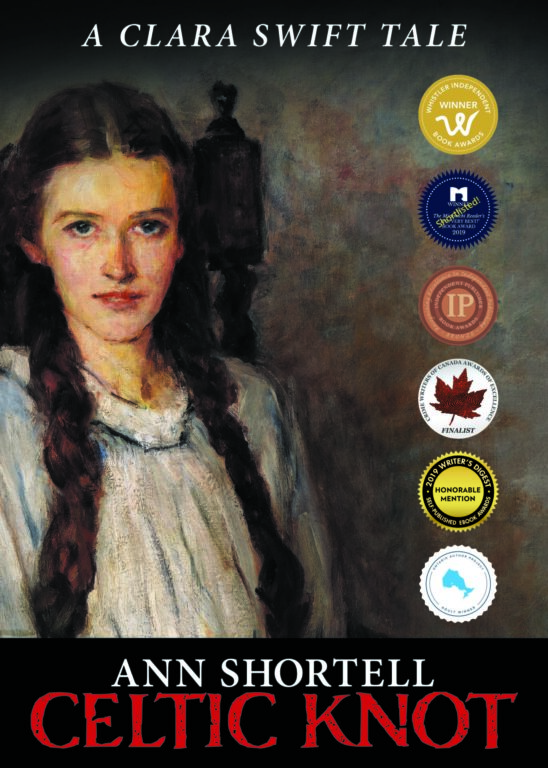A Clara Swift Tale
by

Canada’s great murder mystery—who assassinated poet-politician & Father of Confederation T. D’Arcy McGee —is reimagined through the eyes of Irish housemaid Clara Swift.
It’s hard to think Mr. McGee’s been dead these twelve months. Since that night, all the talk has been of the new word, assassination, which means murder and politics mixed together in a devil’s brew. With all Irish as suspects.
I’ve been twisting this way and that myself, looking for whom to trust.
There’s no question but I was there from start to finish, for sure, and I beg forgiveness nightly for any hand I had in the course of events.
I suspect Mr. Macdonald may tuck away this testament, leaving for posterity’s judgement the strict moral of the choices made. There’s plenty to answer for, with a man shot dead and a man hanged for it.
It’s a heavy weight on me that so many folk believe a lie. Even as I do see it’s safest, while lives are still at stake.
READ MOREMr. Macdonald isn’t a dreamer like Mr. McGee. His tools are people; he knows how they can best be set to use. He looks at me, he sees a maid of all work. When he found me crying the other day because my words aren’t high-minded poetry like Mr. McGee ’s, he said I should write my account of this past year the way I’d do dishes. So that the facts shine, once I’ve cleaned all the muck off them.
No matter the mess the gentlemen have made.
So here’s the clearest reason why I’m the one to set down this tale. I was on the other side of the door when Mr. McGee was shot.
COLLAPSEKirkus Reviews wrote:"Shortell constructs her gripping historical novel on the bones of an actual incident: the murder of Thomas D’Arcy McGee, a staunch supporter of Canadian nationhood and the subsequent hanging of Irish immigrant Patrick James Whelan, who professed his innocence of the crime to the end. Set mainly in Ottawa in 1868, the story is told with brio by 15-year-old Clara Swift, who describes herself as an “Irish girl, British subject and a Canadian all 21 months we’ve had a country.” When Clara, McGee’s servant, hears a gunshot outside the door of their boarding house, she opens the door to find McGee dead. Suspicion immediately falls on members of the Fenian brotherhood, who considered the outspoken McGee to be a traitor to their cause. The authorities, keen to find the culprit, hastily settle on Whelan. Clara, however, is not convinced of his guilt. Shortell vividly conveys the atmosphere that surrounded the murder and examines the profound impact that McGee’s death had on the development of the fledgling nation. This is a lively and fascinating story, well told."
"A historical novel dramatizes the murder of a prominent Irish politician in late-19th-century Canada. "Clara Swift is born in Ireland, but in the late 1860s, she moves to Montreal to work as a servant for fellow Irish native Thomas D’Arcy McGee. McGee is a political agitator of sorts and proposes the consolidation of Canadian settlements into a unified country, a nation that could simultaneously house disenfranchised Irish and serve as an example to the British Crown of the Irish capacity for self-governance. But some Irish radicals—Fenian rebels—are so committed to revolution on their country’s soil that they invade Canada to draw more British troops there, strategically diminishing their number in Ireland. When McGee is murdered, any Irishman in Canada with the most gossamer connections to the Fenians is rounded up as a suspect. On the strength of Clara’s identification, this group includes Jimmy Whelan, who quickly becomes the prime suspect. But for a variety of reasons, Clara remains unconvinced of his involvement—he actually warned the family three months ago of an assassination attempt. Shortell conjures a memorable heroine in Clara: Only 15 years old, she’s uncannily sharp and literarily astute but endearingly guileless. She becomes increasingly concerned that McGee’s murder had something to do with a manuscript he was preparing for publication, a politically provocative critique of Americans. Maj. Pierce Doyle, the lead investigator on the case, recruits Clara to pump Whelan’s wife, Bridie, for incriminating information and to help decode McGee’s private diaries. The author skillfully builds a suspenseful mystery, cautiously meting out just enough information to keep readers gripped by the plot but not so much that the conclusion becomes transparently obvious. In addition, her prose can be elegant: “In some way, this sealed display made it seem that Mr. McGee’s death was all for show. Even Christ’s body hadn’t been left hanging so long as a lesson to his people before he’d been decently interred.” But the novel’s strongest selling point is its artful amalgam of historical scholarship and fictional drama—Shortell brings her meticulous research to vivid life. A thrilling and historically edifying period tale."




